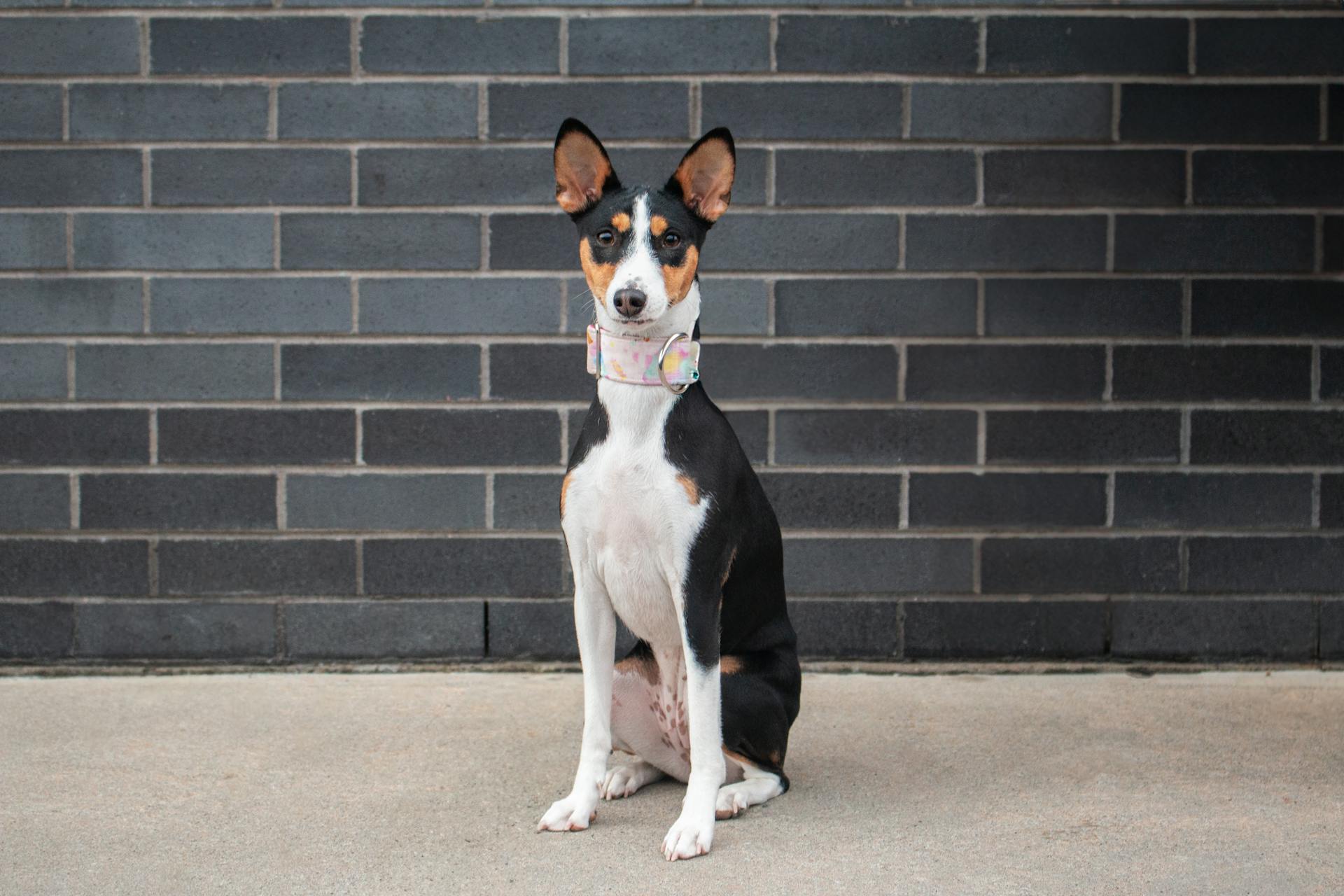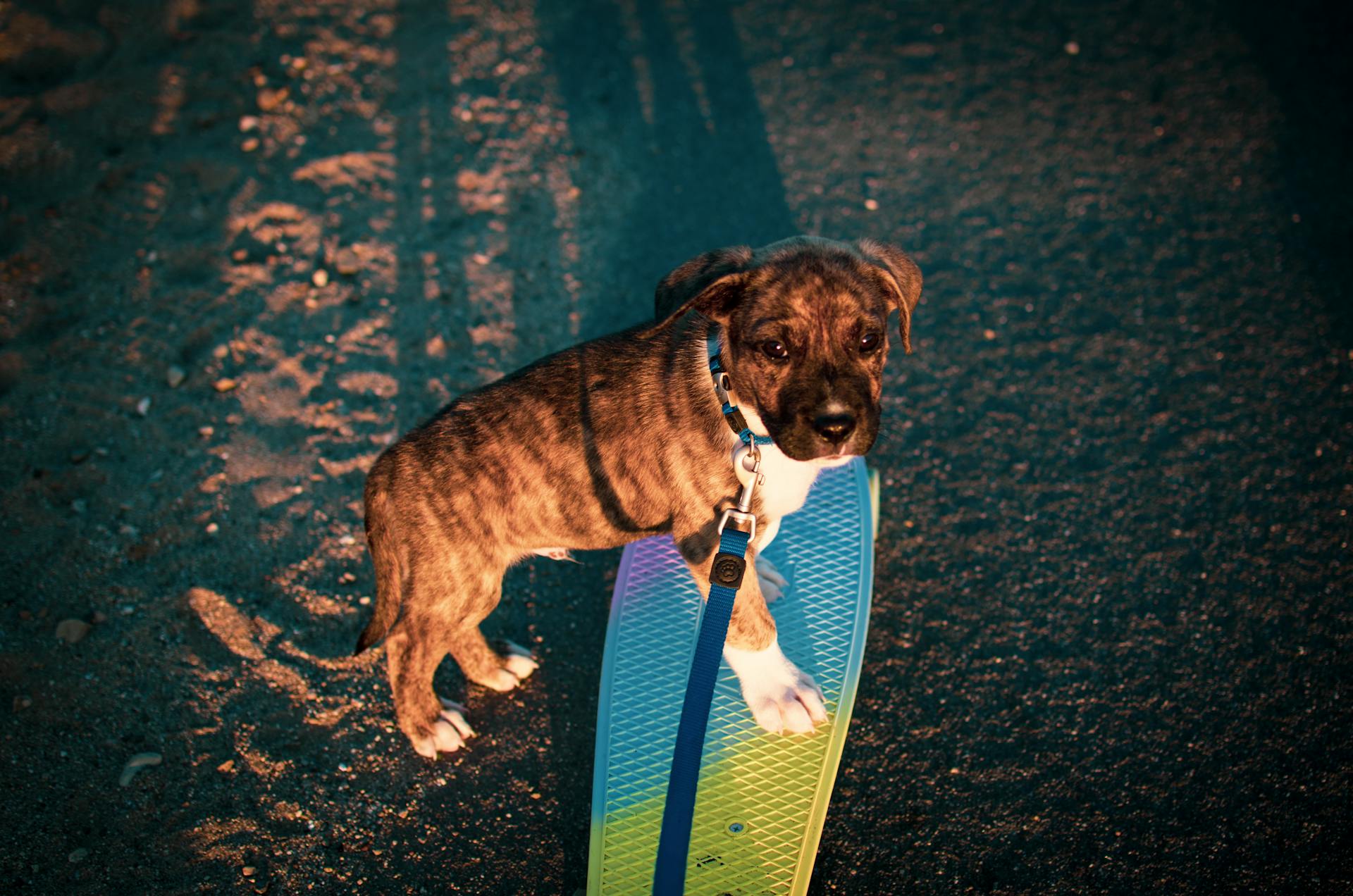
The Basenji Black and White is a unique and fascinating breed. They originated in Africa, specifically in the Congo region.
Their distinctive appearance is a key characteristic of the breed. The Basenji Black and White has a short, smooth coat with a black and white color pattern.
Their short coat requires minimal grooming, making them a great choice for busy owners.
Consider reading: Basenji Benji Dog Breed
Appearance
The Basenji's compact size belies its strong and athletic build, making it a lean yet powerful hunting dog breed.
Their alert, pointed ears and almond-shaped dark hazel or dark brown eyes give them an expressive face.
A bushy tail that tightly curls up against their back is a distinctive feature of the Basenji breed.
Their short coat is fine in texture and comes in four main colorways recognized by the American Kennel Club: chestnut red, black, tricolor (black, tan, and white), or brindle (black stripes on a chestnut base).
The Basenji's low-shedding coat requires very little maintenance, and they spend much of their downtime grooming themselves like cats.
In fact, Basenjis are very fastidious about their grooming, which means they typically don't have that "dog" smell and won't need frequent baths.
Their clearly delineated white chest, feet, and tail tip are a striking feature of the Basenji breed.
A weekly brush and occasional bath are still recommended to keep your Basenji clean and healthy.
The Basenji Club of America has a helpful guide outlining best practices for grooming a Basenji, so be sure to check it out.
The tricolor coat of the Basenji, featuring deep, glossy black, vibrant tan, and white markings, is a striking appearance that's a result of selective breeding and natural evolution.
The black color covers much of the body, providing a rich, deep background that enhances the visibility of the other colors.
The black mask is a common marking where the face or the muzzle of the Basenji is covered with a black color, contrasting sharply with the rest of the body's lighter color.
This versatile facial feature can appear in conjunction with other colors and markings, and is widely appreciated in the Basenji breed.
Suggestion: Rare Basenji Colors
Temperament
Basenjis are an extremely energetic and intelligent breed that requires plenty of daily strenuous exercise and mental stimulation.
They're independent thinkers known for their willful, clever, mischievous personalities and are often compared to cats in their learning style.
Basenjis are smart, active, and require consistent training to thrive, making them best suited for owners with experience.
They're very playful and prefer to have their owners within sight at all times, which can be both a blessing and a challenge for busy owners.
If not properly exercised or left alone for too long, Basenjis tend to become noisy and show undesirable behaviors.
A well-adjusted Basenji can be good with cats, other dogs, and older children, but proper socialization is key, especially for children who need to learn how to interact with dogs safely.
Basenjis are notorious for their unique yodeling noise, which they use to sound the alarm when they see something suspicious, whether it's a delivery person or a passing squirrel.
It takes a sense of humor to live with a Basenji, as they have a tendency to destroy items when left to their own devices, but this also means they'll keep you on your toes and encourage you to keep a clutter-free home.
Related reading: Black Cats
Care
Basenjis are a low-maintenance breed when it comes to self-care, spending hours grooming themselves.
They require minimal brushing, just once a week to keep their skin healthy and coat looking sharp.
Basenjis are sensitive dogs that need patience, creativity, and positive reinforcement during training.
Giving them plenty of treats during training makes the experience fun and helps them learn.
Their nails should be trimmed if you can hear them tapping against the floor.
Regular brushing is also a good time to check their ear and dental health.
For your interest: Basenji Training
Puppies
Puppies are a handful, especially when they're young and full of energy. Basenjis, in particular, are known for their bountiful energy and high intelligence.
They can be quite mischievous, so socializing and training early on is crucial to develop a well-adjusted adult.
You may need to get on a waitlist for a Basenji pup, as they're a rare breed and breeders only have limited litters once a year.
Keep in mind that puppy mills are unlikely to have Basenjis, and even if they do, it's best to keep looking.
Care

Basenjis are low-maintenance when it comes to grooming, requiring only a weekly brushing to keep their coat healthy and looking sharp.
Few baths are needed, as they spend hours grooming themselves, just like cats.
Regular brushing is also a good time to check for signs of ear and dental health, as well as nail length.
A pale pink ear canal with little to no wax is normal, but be sure to check for signs of movement or foreign objects.
Their teeth should be brushed often to maintain good oral health.
Basenjis are smart dogs, but they require patience, creativity, and positive reinforcement during training.
They're sensitive dogs, so a heavy hand during training is not recommended.
Giving them plenty of treats and making training a fun experience can help them learn and thrive.
Additional reading: Basenji Health Issues
Pet Compatibility
Basenjis can get along with other dogs of medium to large breeds, but they're not suitable for homes with small animals.
Their instinct as hunting dogs makes them prone to stalking, chasing, and possibly killing cats and other small animals. This behavior is difficult to control, especially with impulse control issues.
They're known to hunt and chase wildlife and small game, so if you live in an area with a lot of wildlife, a Basenji might not be the best fit.
In a household with small pets, it's best to consider a different breed to ensure everyone's safety and well-being.
If this caught your attention, see: Black and White Cattle Dogs
Choosing a Color
The American Kennel Club breed standards accept four Basenji colors, ranging from deep black to warm chestnut red. These colors are more than just visual appeal, as they highlight the breed's elegant, short coats.
Basenjis come in a variety of colors, including black, red, brindle, and white, with distinct lines of demarcation like the classic black mask and brindle stripes. The breed's colors are a beautiful aspect of their overall appearance.
While the colors of a Basenji might be your initial attraction to the breed, it's essential to consider the dog's health, temperament, and how well they will fit into your lifestyle. Basenjis are energetic and intelligent dogs that require engagement and exercise.
The Basenji breed does not have color-linked health issues as prominently as some other breeds might, but genetic diversity, including color genetics, can influence overall health. This is why maintaining genetic diversity, including the preservation of less common colors, is vital for the breed's health.
Fun Facts
Basenjis are thought to be the inspiration for the image of Anubis, the Egyptian god of mummification and the afterlife. This ancient connection is a testament to their enduring appeal.
Their short-haired coat is nearly odorless and clean, thanks to their cat-like self-grooming habits.
Basenjis are known for their distinctive yodeling noises, rather than a typical yip. It's a sound that's both haunting and beautiful.
In ancient times, Basenjis were brought up the Nile from central Africa as gifts for the Egyptian pharaohs. This speaks to their value as prized companions.
Here are some fun facts about Basenjis:
- Basenjis are almost cat-like in the way they self-groom.
- Basenjis make yodeling noises.
- In ancient times, Basenjis were brought up the Nile from central Africa as gifts for the Egyptian pharaohs.
- Basenjis were used by Central African tribesmen as prized hunting dogs.
About
The Basenji is a unique and fascinating breed. They are often referred to as "barkless" dogs because they don't bark like other breeds.
Their distinctive yodeling howl is a characteristic sound that's often described as a yodeling cry. This is due to their unique vocal anatomy.
The Basenji is an ancient breed that originated in Africa, specifically in the Congo region. They were bred to hunt small game.
They are known for their short coats, which require minimal grooming. This makes them a great choice for busy owners.
Their intelligence and independence make them a challenging breed to train. Consistency and patience are key when working with a Basenji.
Frequently Asked Questions
Is Basenji a rare dog?
Yes, Basenjis are considered relatively rare compared to other breeds, ranking 85th most common according to the AKC. Despite their rarity, Basenjis are gaining popularity and are now more widely recognized.
Featured Images: pexels.com
